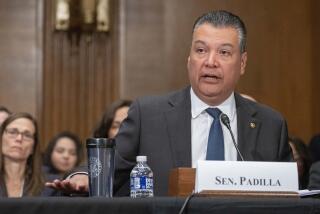Healthcare bill’s advocates fight off liberal opposition
- Share via
Reporting from Washington — The White House and several advocacy groups banded together Thursday in an attempt to pacify liberals who are furious over compromises made to the Senate healthcare legislation. The bill’s advocates said that it still would make a difference in the lives of Americans, and warned that the cost of failure was high.
Former President Clinton issued a statement that said: “America can’t afford to let the perfect be the enemy of the good. And this is a good bill.” And abandoning the effort to pass healthcare legislation would be “a tragic outcome,” David Axelrod, a senior advisor to President Obama, told MSNBC.
Axelrod and Clinton largely were pushing back at Howard Dean, former head of the Democratic National Committee, and his liberal advocacy group, Democracy for America. In recent days, Dean has taken to the airwaves and news pages to savage the Senate bill, saying it should either be changed or killed.
“We’re on the verge of something that would make an enormously positive difference for people,” Axelrod said.
The bill still must clear the Senate. That prospect remained uncertain Thursday as Sen. Ben Nelson (D-Neb.) refused to commit to voting for the legislation in the absence of stronger language restricting the use of federal subsidy funds to cover abortion.
Senate leaders are pushing for a final vote by Christmas, and until 60 senators commit to the bill, it is stuck in neutral.
Obama also kept up his effort to woo Maine Sen. Olympia J. Snowe, a moderate Republican who backed healthcare legislation in the Senate Finance Committee earlier this year. Snowe, who has said that she needs more time to review the legislation, met with the president and the White House and talked with him by phone Thursday, she said.
But even as the proponents of the Senate healthcare legislation attempted to mollify Nelson, they were fending off charges from liberals that deals struck to garner the support of a handful of holdouts had, in essence, gutted the bill.
Jim Dean, chairman of his brother’s Democracy for America group, said that Senate leaders “gave away the store” to a few moderate Democrats who had demanded several important provisions be stripped from it.
Earlier this week, under pressure from Sen. Joe Lieberman (I-Conn.) and others, Majority Leader Harry Reid (D-Nev.) agreed to drop a provision that would have allowed some Americans as young as 55 to buy in to Medicare. The idea was favored by some as an alternative to creating a public option, or government-sponsored insurer, to offer health policies in competition with private insurance companies.
Dropping the provision “has frustrated an awful lot of people,” Jim Dean said. “The calls have been coming in for the last 48 hours. Everybody is very angry.”
That included Markos Moulitsas Zuniga, founder of the influential liberal blog Daily Kos, who wrote on Twitter: “Time to kill this monstrosity coming out of the Senate.” And MoveOn.org said that it had raised $1 million this week in a campaign to hold Lieberman “accountable” for killing the Medicare buy-in plan.
But other liberal advocacy groups, along with labor unions, restrained their criticisms.
Richard Kirsch, national campaign director for Health Care for America Now, said that his members were “angry and somewhat disgusted by the politics in Washington.” But rather than call for killing the Senate bill outright, he said, the group was determined to force changes to the legislation in later negotiations between the Senate and House.
The House legislation includes a public option to give some consumers an additional choice for buying insurance. The House also taxes wealthier Americans to cover the cost of expanding insurance to more people; the Senate bill relies heavily on taxing high-value insurance plans, which could hit some union members.
The powerful AFL-CIO and the Service Employees International Union said they would push House members to stand up for their version of the legislation when the House and Senate bills are molded into a single measure. SEIU President Andrew Stern also called on Obama to make his presence felt in the negotiations.
“We’re encouraging him to really step in here now at the end of the process,” Stern said, “where his position really matters.”
More to Read
Get the L.A. Times Politics newsletter
Deeply reported insights into legislation, politics and policy from Sacramento, Washington and beyond. In your inbox twice per week.
You may occasionally receive promotional content from the Los Angeles Times.










